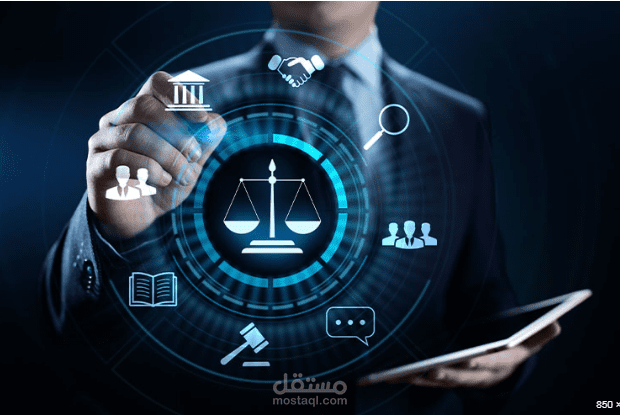The large number of theories in digital transformation indicates that there are no unified standards for digital engagement
تفاصيل العمل
The large number of theories in digital transformation indicates that there are no unified standards for digital engagement
Our theory calls for unifying the perspective and standards for addressing digital transformation.
The proliferation of theories in digital transformation indicates a lack of unified standards for digital engagement. The emergence of numerous theories reflects the diversity of perspectives from which experts view this topic. This diversity stems from their different fields of specialization, where each field approaches digital transformation from its unique perspective. This phenomenon is due to the dominance of practical expertise in the digital realm in the absence of a theoretical framework often governed by the philosophy or jurisprudence of law. For instance, innovation and technology experts focus on how digital innovations change traditional work methods, while management and organizational experts concentrate on how organizational structures adapt to digital changes. Conversely, programming experts view it from the angle of operating systems and their various languages, and so on.
In the field of law and legislation, the primary goal is to ensure that digital transformation aligns with existing laws and protects the rights of individuals and society. This involves examining the legal aspects of virtual identities and ensuring that digital activities do not conflict with intellectual property rights, privacy, and security.
The diversity of theories about digital transformation is due to the multiplicity of angles from which experts approach this topic, based on their different fields of specialization. This diversity enriches the comprehensive understanding of digital transformation from the legislator's perspective, who deals with experts as consultants and advisors, thus being the follower while the legislator is the leader. However, it is also necessary to ensure that these theories align with laws and regulations to guarantee a safe and sound digital environment across all specialties.
Unifying the Approach to Digital Transformation through Legislation and Legal Philosophy
The multitude of theories around digital transformation reflects the complexity of this field and the diversity of its aspects. However, it is possible to achieve a unified approach to digital transformation through the gateway of legislation and legal philosophy. This approach is not only capable of covering the technical, organizational, economic, and social aspects of digital transformation but also provides a comprehensive framework that ensures the protection of rights and regulates digital activities in a manner consistent with current laws.
Why the Legal Angle Is Stronger than the Specialty Angle in Digital Transformation
Law as the Organizer and Manager of Form and Substance:
The law serves as the fundamental framework that organizes and manages the form and substance of individuals, activities, and entities in the tangible traditional world. It defines relationships between individuals and entities, setting rules that ensure justice, protection, and transparency in interactions. This organizational need extends into the digital environment, requiring the same level of organization and transparency to ensure fair and orderly proceedings.
Specialists Provide Advisory Opinions but Cannot Resolve Issues:
While specialists offer insights and classifications in specific areas based on their practical experience and specializations, their role should primarily be advisory. Experts in technology, economics, social networks, and other fields provide insights and recommendations that help understand and apply new technologies and methods. However, these insights do not address the legal and ethical issues arising from digital transformation. In contrast, the law addresses these issues by establishing a legal framework that regulates the application of the leap to the digital world. This includes verifying elements, structures, constants, branches, main and secondary components, equipment, media, influential and affected entities, producers, consumers, actors, and reactors to achieve a proper classification and comprehensive arrangement of digital transformation.
Unifying the approach to digital transformation within the legal framework ensures comprehensive regulation of all aspects of digital transformation, including technical, economic, social, and even psychological aspects. The law can establish an inclusive and unified framework that organizes these aspects, ensuring their interaction and integration in a harmonious manner. This inclusiveness is not found in individual specialty angles, which may be limited to a specific narrow scope ranging between specialized expertise and practical application.
Searching for a Comprehensive Legal Angle
Analyzing Existing Legal Aspects:
Initially, understanding and analyzing current laws related to digital transformation, such as data protection laws, intellectual property rights, and cybersecurity.
Identifying Legal Gaps:
By reviewing current theories, identifying legal gaps that may require new legislation or legal amendments to cover all aspects of digital transformation.
Developing a Comprehensive Legal Framework:
Creating an all-encompassing legal framework that covers all diverse aspects of digital transformation, including innovation, organizational change, technology, social networks, big data, and cloud computing.
Ensuring Law Adaptability with Future Developments:
Ensuring that the legal framework can adapt to future developments in digital transformation by adding flexible legal provisions that allow for continuous updates.
The Ability of the Legal Angle to Cover All Aspects
Organization and Management:
Regulating relationships between individuals, companies, and organizations in the digital environment, ensuring justice and transparency in digital transactions.
Security and Privacy:
Protecting personal data and ensuring cybersecurity.
Innovation and Technology:
Supporting innovation and ensuring intellectual property rights.
Digital Economy:
Regulating digital economic activities and stimulating sustainable economic growth.
Social Networks:
Regulating the use of social networks and protecting users from violations.
Conclusion
By unifying the approach to digital transformation through legislation and legal philosophy, we can create a comprehensive and flexible framework capable of covering all aspects of digital transformation, ensuring that this transformation occurs in a manner consistent with rights and laws. This unification helps reduce theoretical chaos and ensures a safer, more just, and effective digital environment for everyone.
Author : CHAFAA BELAID ACHOUR
Writing date: 01.12.2022
Date of publication: 11/07/2024
